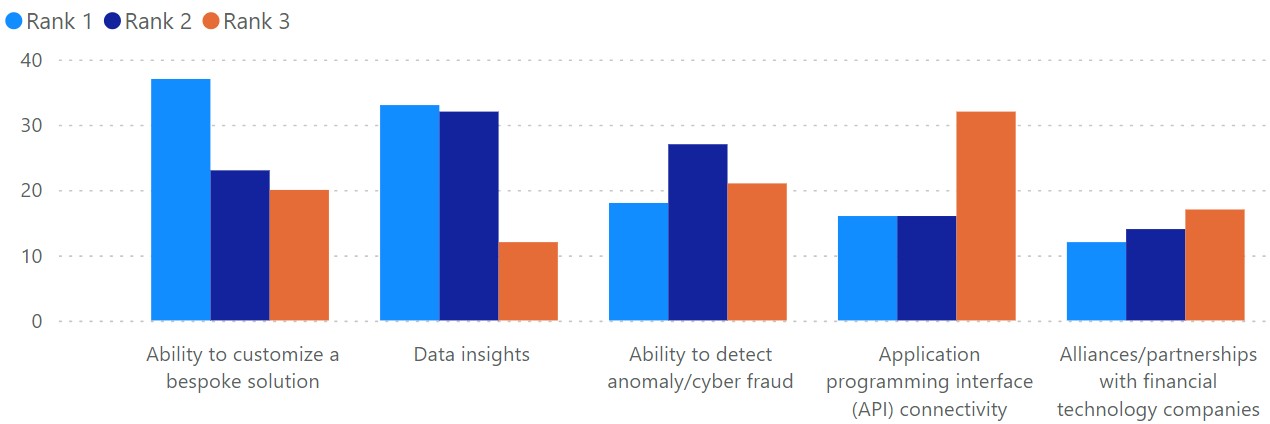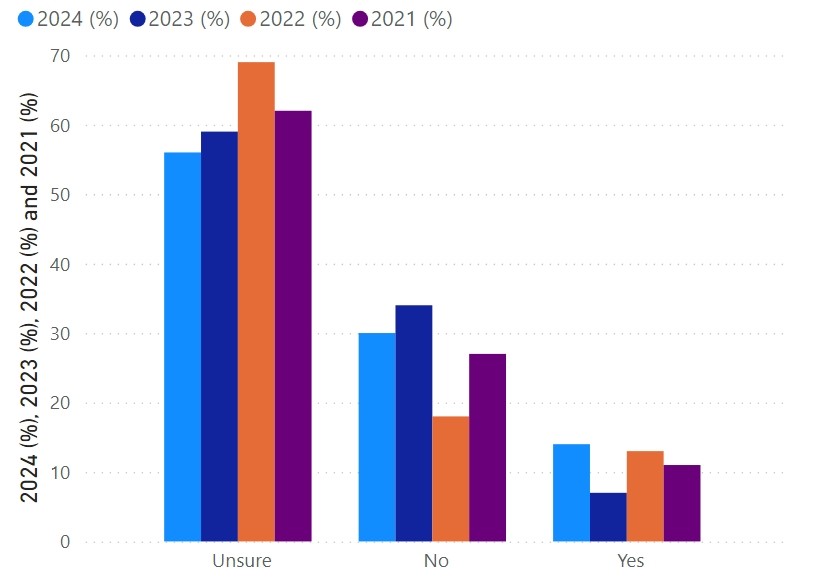Digitalization continues to transform the financial services industry, requiring asset owners and managers to manage and benefit from the massive amounts of data generated by technology-driven operations. This has put the onus on asset service providers to meet the new requirements for asset allocation and portfolio management, as well as to ensure the sustainable growth of businesses.
Digital transformation is among the major topics of the 2024 Asset Servicing Insights Asia, an annual survey conducted by Asset Benchmark Research that covers over 220 financial institutions, including asset managers, financial intermediaries, asset owners, and issuers across the region.
According to survey, a significant 76% of respondents are already benefiting from digitalized services or products provided by their asset service providers. This shift towards digitalization has already become a necessity instead of being just a trend, driven by the demands of asset owners and managers for more agile, customized and data-driven solutions.
The survey highlights that 50% of asset owners and managers consider the ability to customize a bespoke solution as one of the top three considerations when seeking digitalized services.
This demand for customization reflects a broader trend in the financial services industry where one-size-fits-all solutions are no longer adequate. Solid digital capability enables custodian banks to tailor their offerings, providing more value and aligning more closely with their clients' requirements.
The three most important digital capabilities when choosing a service provider
 Source: Asset Benchmark Research
Source: Asset Benchmark Research
Equally important is the capability to provide data insights, with 49% of respondents identifying it as a critical factor. When talking with industry players, The Asset has noticed that many custodian banks and fund administrators have been improving their capabilities and solutions to empower asset managers to make better use of data such as through performance analytics and risk management insights. Some service providers have rolled out platforms that enable asset managers to access a wide range of data management suites and analyze reports more efficiently.
Access to comprehensive and actionable data insights can significantly enhance decision-making processes and save time and costs. Meantime, some of the service providers are encouraging employees to upgrade their digital skills by offering training courses. These practices have not reduced the headcount as some fear but have spurred employees to enhance their skills and be able to perform their duties in a more extensive and in-depth manner, according to a custodian banker talking to The Asset.
Security remains an important concern. The survey finds that 36% of respondents prioritize the ability to detect anomalies or cyber fraud when choosing a service provider for digitalized services and products. Custodian banks have stressed the importance of data security. They have been proactively enhancing their tech capabilities, utilizing tools such as big data, blockchain, artificial intelligence and machine learning to monitor transactions in real-time, identify unusual patterns, and prevent fraudulent activities.
Application programming interface (API) connectivity continues to be a critical capability, with 32% of respondents emphasizing its importance. APIs facilitate seamless integration between different systems, enabling efficient data exchange and automation of processes. This connectivity enables asset owners and managers to gain more flexibility and efficiency. Custodian banks believe that their clients are well-positioned to digest the wide range of APIs provided.
In addition, the ability to partner with fintech companies (23%) is also highly valued by some asset owners and managers.
The survey findings also highlight several key benefits that asset owners and managers gain from digitalized services. The most frequently mentioned benefit is reduction in transaction time, with 80% of respondents citing it among the top three advantages. Cost savings have been cited by 68% of respondents as another crucial benefit.
How have digitalized services / products improved the experience of asset owners and managers?
.jpg) Source: Asset Benchmark Research
Source: Asset Benchmark Research
Digitalized services and products automate routine tasks, streamline processes, minimize manual intervention and errors, as well as accelerate transactions, leading to faster execution and lower operational costs for clients. Most of the asset servicing providers with solid digital capabilities are well-positioned to transition to the T+1 settlement cycle for US securities which started on May 28 this year.
Digitalization has also resulted in an increase in the number of transactions, according to 43% of respondents. The efficiency and scalability of digital systems allow custodian banks to handle higher transaction volumes without compromising on accuracy or speed.
Custodian banks have been actively building their infrastructure around capabilities to service digital assets, although the demand for such services still has room to grow.
The survey finds only a stable 2% of respondents are investing in digital assets, with their investments focusing on cryptocurrencies. As in previous years, digital exchanges and digital funds remain the major channels to tap this market.
Most respondents who are reluctant to invest in digital assets have risk concerns (33%) and regulatory concerns (31%), while 21% cite the lack of information to make investment decisions and 3% talk about the lack of opportunities.
Despite the concerns, 14% of respondents say they will invest in digital assets in the future, double the number last year.
Do you plan to invest in digital assets in the future?
 Source: Asset Benchmark Research
Source: Asset Benchmark Research
Those who are unsure dropped slightly by 5%, standing at 56%, while those who say no to digital assets fell by 12% and now account for 30%.
A significant 62% of respondents plan to engage digital asset service providers, with safekeeping being the most important function investors expect from them.









